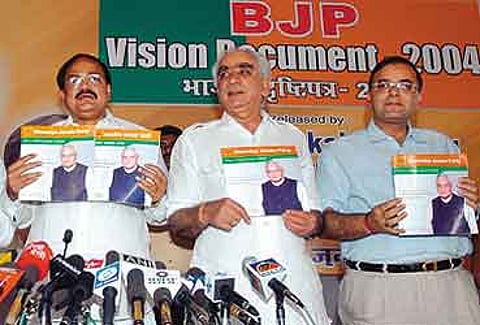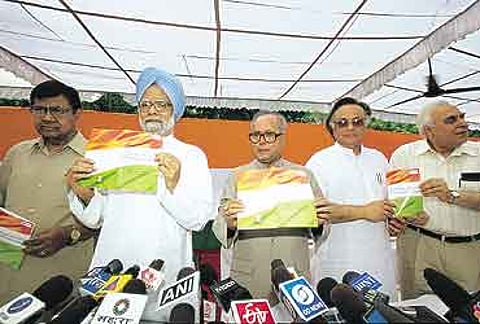But the BJP is not going to leave the manufacturing sector to its fate either. Says a party spokesperson: "We believe India can become a global manufacturing hub. We have had considerable success in several industries like auto components, engineering and pharmaceuticals. Our aim is to provide conditions for a broad manufacturing base and compete with the best in the world in terms of quality and technology. We will take measures to open up manufacturing so that this goal is achieved." Additionally, the recent successes in the services sector will help make India a knowledge-based economy. This in turn will be supported by reforms in the financial sector and capital markets to encourage wealth creation, which will ultimately translate into growth. In short, no stone will be left unturned.
The Congress too wants to attack the full economic spectrum through a three-pronged strategy. One, raise the rate of investment, both domestic and foreign, for which a congenial atmosphere will be created. Two, raise productivity by improving access to credit and restoring fiscal discipline by controlling capital expenditure. Three, facilitate efficiency and productivity through public-private partnerships to promote development and investment activities. Adds Ramesh: "The focus will also be on increasing public investment in agriculture, which will spur private investment. And we need to create jobs. We cannot have jobless growth as we have had in the last five years." Agrees former finance minister Manmohan Singh: "We intend to evolve a pattern of development and growth to restore employment elasticity to the 1983 level."
On a sensitive issue like disinvestment, both parties have added their own caveats to protect themselves against any criticism that they are selling off the family silver.For example, the BJP, which has achieved considerable success in privatising psus in the last fiscal, has come up with a guarded vision. Its vision document states: "The government should create more avenues for entrepreneurship in a well-regulated competitive framework and progressively withdraw from involvement in non-priority sectors. In general, it should reduce its role in manufacturing and services business, where the private sector can serve the people better." But then, listen to Vijay to read between the lines: "We are clear that government should withdraw from non-priority sectors. But we want it to continue in strategic sectors like telecom to prevent private companies from turning the sector into a monopoly."
Din Of Gloated Glory
In a poll where economic growth forms the crux of the debate, all parties claim to have the success formula


The Congress on the other hand, feels that indiscriminate selling of psus is not in the country's best interests. Says a party spokesperson: "Reforms cannot be judged through the lens of privatisation. Disinvestment is not the be-all and end-all of reforms. We still believe in the public sector. We believe in selective privatisation. We wouldn't have privatised IPCL and VSNL and we'll definitely not privatise Indian Oil. However, we believe that in many areas, the public sector should act like a venture capitalist, initiate new projects, stabilise it and then transfer it to the private sector. The proceeds of disinvestment should be utilised for social causes rather than meeting budgetary deficits as is being done now."
The Left parties, which have traditionally opposed disinvestment, agree with this logic. Says CPI(M) politburo member Sitaram Yechuri: "The NDA-sort of privatisation makes no economic or common sense. It's like a farmer selling his land to meet his daily expenses."
But, as expected, the Left's concept of reforms is entirely different from both the BJP and Congress line of thinking. Contrary to the claims made by the BJP, the general feeling in the Left camp is that the ongoing reforms have achieved little. Says Yechuri: "The first generation of reforms have just accentuated the inequalities in society. It has helped only the corporate sector, and that too only the top 10 per cent. For the rest, it's a survival game. What we need is a total review of the reforms." For them, the primary aim of the reforms should be employment generation, increasing purchasing power across classes and development of socio-economic infrastructure.
Whichever party one looks at, the intentions seem to be noble and there's an articulated determination to take India to dizzying heights. But these are pre-election promises and could have a lot of people reaching for the salt shaker. Also, a lot will depend on the nature of the new regime. For, there'll be pulls and pressures if a weak coalition assumes power. If not, maybe the country will move faster along the reforms track. Smell the burning rubber?
Tags